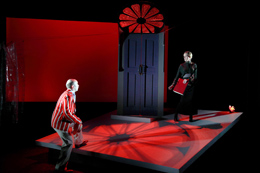It’s nearly forty years since Tom Stoppard’s Travesties first appeared on the London stage and it’s difficult to calculate the degree of seismic postmodern shift in sensibility since then. Bolstered by technology that facilitates the fracturing of chronology and narrative, recent drama is littered with instances of historical figures engaged in activities more imagined than verifiable. What are theatrical tropes now, were new and electrifying when Stoppard’s early work bounded onto the boards. The job of today’s director is to keep that shock immediate and the crucial wordplay both relevant and new. Of course it helps to have a script of such maniacal genius to work with, and director Lynne Parker is both at home with Stoppard and alive to interpretative possibilities for the twenty-first century.
 For Irish audiences Travesties has particular resonance, with its swiping of the plot from Wilde’s The Importance of Being Earnest, its breakaway characters interacting with fictionalised versions of James Joyce, Tristan Tzara and Vladimir Lenin. All three were resident in Zurich during The Great War; each in his sphere (linguistic, aesthetic, political) was an anarchic visionary intent on fracturing the prevailing system. Stoppard’s play focuses on the effects of the breakdown of nineteenth-century verities across Europe at the time, and his characters in turn pronounce on the function of art and the role of the artist in modern society. In this era of draconian cuts it wouldn’t go amiss to have some Stoppard to hand to quote at budgetary meetings.
For Irish audiences Travesties has particular resonance, with its swiping of the plot from Wilde’s The Importance of Being Earnest, its breakaway characters interacting with fictionalised versions of James Joyce, Tristan Tzara and Vladimir Lenin. All three were resident in Zurich during The Great War; each in his sphere (linguistic, aesthetic, political) was an anarchic visionary intent on fracturing the prevailing system. Stoppard’s play focuses on the effects of the breakdown of nineteenth-century verities across Europe at the time, and his characters in turn pronounce on the function of art and the role of the artist in modern society. In this era of draconian cuts it wouldn’t go amiss to have some Stoppard to hand to quote at budgetary meetings.
Parker and her actors are in full command of this demanding text, with its instant replays of variations on events and dialogue, and Rough Magic’s crucial pacing precludes the possibility of restlessness on the part of the audience. In a climactic syncopated trio in music hall time, with spoons, Philip Judge as Bennett the butler (joined by Camille Ross as Gwendolyn and Jody O’Neill as Cecily) gives a bonanza performance which goes far beyond channelling Wilde’s butler, Lane.
The whole tale is mediated through the unlikely consciousness of one Henry Carr, a minor, and real, British diplomat, with whom Joyce crossed paths (and swords) in Zurich. Will Irvine’s Carr is the fulcrum in a six-hander in two time frames: that of 1917 when events did or did not take place, and years later when, in retirement, he is making a mental catalogue of possible titles for his still unwritten memoirs. Irvine’s performance balances the foppish elements of a minor functionary, who is dapper and vain, with his being the only man in the group who has actually experienced war. The latter element of the performance makes his Carr a valid antagonist for many of the aesthetic and political theories the others spout.
Peter Daly as Lenin brings the geopolitical reality of the era into focus, but even Lenin’s pronouncements on art are fodder for Stoppard’s mill. We see both Lenin and Joyce writing manifestos which became well known in time. Ciaran O’Brien’s Tristan Tzara has, in a way, the hardest task. The founder of Dadaism is far less iconic than either Joyce or Lenin in the popular imagination; but O’Brien’s interpretation of Tzara’s nihilistic rejection of all structures becomes the recognizable posture of the rebel, his strutting surety conveying the zeal of the true believer.
It is to his Joyce character, though, that the playwright gives the finest lines on art and its worth. But Stoppard’s Joyce is also a somewhat petulant Irishman waging war with a minor British official. Ronan Leahy projects both Joyce’s insecurities as a man and his unwavering conviction as an artist, a difficult mix. All are costumed with a careful eye to their differences in character, station and ideological stance. The female duo, one as curvy as the other is severe, hold their own in a play overbalanced in favour of male roles. Camille Ross adds needed sauciness into the mix, and Jody O’Neill a crystalline wit.
 Lighting by Sinéad McKenna is particularly effective in the second act, projecting an image of a Victorian hobbyhorse with super-inscribed text onto a screen. One small glitch meant that the central feature of a transom over the door, through which all enter and exit, cast a dark spot on foreheads and faces, an unfortunate distraction.
Lighting by Sinéad McKenna is particularly effective in the second act, projecting an image of a Victorian hobbyhorse with super-inscribed text onto a screen. One small glitch meant that the central feature of a transom over the door, through which all enter and exit, cast a dark spot on foreheads and faces, an unfortunate distraction.
Parker, doubling as set designer, makes use of a pitched platform as central feature, excellently surrounded by Victorian trappings which take on a discarded air on the edges of the stage. These visuals mesh adroitly with the text, suggesting to contemporary audiences a continuity which time has proven. It was a prospective not available to those daring innovators in the first years of the last century, but, Stoppard tells us, we are the beneficiaries of both that innovation and the continuity, and should rejoice in our complex artistic inheritance.
Christina Hunt Mahony, who directed the Center for Irish Studies at the Catholic University of America, now lectures in Trinity College. She is the editor of Out of History: Essays on the Writings of Sebastian Barry.